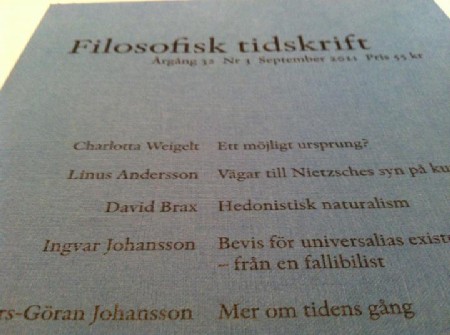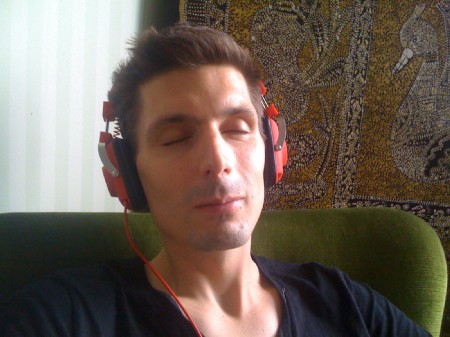Pure Self-indulgence
3 oktober 2011 | In academia Self-indulgence | Comments?
I always intended to do this, but kept putting it off. ”Filosofisk tidskrift” is one of two light-on-design-semi-heavy-in-content philosophy publications in Swedish. There is an idea that swedish as a philosophical language is getting eroded (Admittedly, it was never much of a land-mass), and FT is part of the effort to keep the pot if not exactly boiling, at least luke-warm. Another part is that strangely popular radio-show which I haunted for two weeks and was never asked back on. As ardent readers of this blog and other things I write might have noticed, I’m no help in this effort.
But look! There it is, my name on the cover. As mentioned, I always intended to write for it, and have a folder with half-written texts and barely hatched ideas with the name ”good enough for FT?” slapped on it. With entries dating at least 15 years back (and keep in mind that I am a measly 32). So am I finally getting around to writing philosophy in swedish? Will that folder and those desk-drawers finally start on a publishing career on their own?
I’m sorry I’ll have to reveal to you the origin of the text now in print. It’s a translation. I wrote it in english a few years ago when I taught an advanced course in value-theory and found that no text available would do for my purposes. And last summer when I kind of thought that my confidence could do with the boost of a publication, I sat down and translated it.
The text is surprisingly non-self-indulgent. I don’t develop my own theory in it as much as I recognize it’s theoretical forebears. It’s got a bit of Peter Railton in it and the marvelous Leonard Katz finally gets the credit he deserves.
So if you’ve ever held this piece of sad-looking cardboard publication in your hand and thought that you’d read it one day but kept putting it off, like I did writing for it: Why not do what I did, and make it this issue?
The Philosophy of Hate Crime Symposium
25 september 2011 | In academia Hate Crime Moral philosophy politics Self-indulgence | Comments?Tomorrow it starts: the Philosophy of Hate Crime Symposium, the 2nd in a series of symposia in the When Law and Hate Collide project. The Symposium, as far as I know, is the first to concentrate on philosophical aspects of Hate Crime and Hate Crime Legislation. (There has been a Law and Philosophy special issue, however, on Hate Crime Legislation back in 2001).
It is also quite unique insofar as, amazingly, I’m hosting it.
It is a symposium about hate. As a counter-weight to that other, more famous, 2400 year old symposium.
Here’s the schedule. As you can see, it’s all very interesting stuff
Monday 26/9
Introduction: How Law and Hate Collide
Mark Cutter, University of Central Lancashire and Christian Munthe, University of Gothenburg
Moving Beyond “Hate” Crime
Barbara Perry, Department of Social Science and Humanities, University of Ontario Institute of Technology
How hate hurts. The moral philosophical basis of ‘hate crime’ laws
Paul Iganski, Department of Applied Social Science, Lancaster University
Targeting Vulnerability: A Fresh Set of Challenges for Hate Crime Scholarship and Policy?
Neil Chakraborti, Department of Criminology, University of Leicester
The OSCE and its Work on Hate Crime
Joanna Perry OSCE
Panel Discussion
Tuesday 27/9
Criminalizing Hate, Criminalizing Character
Heidi Hurd, University of Illinois, College of Law
Hate as an Aggravating Factor in Sentencing
Mohamad Al Hakim, Department of Philosophy, York University
Two Kinds of Expressive Harm
Antti Kauppinen, Department of Philosophy, Trinity College Dublin
Philosophy of Hate Crime – a Conceptual Framework – Morality, Law and Public Policy
David Brax and Christian Munthe, Department of Philosophy, Linguistics and Theory of Science, University of Gothenburg
General Discussion
The symposium will be filmed and made available to the public as soon as possible. Watch the upcoming webpage: www.h8crime.eu
Hi Blog, it’s me David
28 augusti 2011 | In Meta-philosophy parenting Psychology Self-indulgence | Comments?Most blogs are abandoned within a year, according to statistics that I just made up. Due to distractions, lack of readers or time, or just the failure to make blogging part of the unforced everyday writing that just sort of happens in a writing person’s life. The sort of writing that doesn’t take more time than it does to read it. Just thinking in a slightly more public medium.
What I’m saying is that I intend to, and kind of think I ought to. Just not when it competes with the much superior activity of hanging with this guy.
A tale of three cities
20 juni 2011 | In Self-indulgence | Comments?(Another rare venture, this time into travel writing).
Five minutes out of a long, cold shower, and only five minutes before the late night Manhattan heat and humidity knocks me over again, so I better make this quick:
In his famous essay ”Here is New York”, E.B. White writes that there are roughly three New Yorks. One consisting of the people who have always lived here, who brings the history, the stability, the foundations for the city. These are basically unimpressed people. Then, the settlers, for whom New York was the big goal. These people bring the joy, the creativity, the drama. But, importantly, we also have the third New York: the commuters. The people who only work here. White is not too kind to these people, but credits them with the nerve, the pulse, the restlessness. ”This New York is the city that is devoured by locust each day and spat out each night”, White writes.
The relative absence of this category, as a big article in the Village Voice pointed out, is one reason for staying in the city during the summer. White seem to think of them as soul-less creatures, based on their obsession with time-tables and reluctance to walk aimlessly in Central Park. Meaning that you don’t actually have to wait until summer, the Park and, by implications, the museums and restaurants (at night time) are free of these people as well. White may recognize that they are needed for economic reasons, but he’s not too happy about it. And while the reslessness accounts for many of the bad things associated with New York (the stress, the rudeness), perhaps there are good things too. Even the creative settlers often end up doing work in organizations, firms, theaters, partly run by commuters, and thus being forced to deliver the goods.
Three New Yorks, as anyone will tell you as soon as look at you, is a massive underestimation. It takes three minutes by foot from Ivy League Columbia to what seems like deepest Harlem. A fancy restaurant may be located less than a block from a location where it would be unimaginable. If Jon Stewart is in the audience and hears the start of a predictable joke on Letterman, he can run over to his own studio, press ”record” and yet beat Letterman to the punchline. The thing with the true, large, number of New Yorks is that many of them are really tiny. In most places, if you feel that you just walked into the wrong neighbourhood, you better turn around. Here, for the most part, you just keep walking until it changes again.
This time, we are visting the children’s New York (the true New Yorkers perspective of which is excellently described in Alan Gopnik’s ”Through the Children’s gate”). This means playgrounds, Museum chases, reluctant shopping and what can only be desribed as a version of the Stendhal Syndrome at FAO Schwartz. It also means, as any New York visit does (and any visit at the Metropolitan Museum of Art, for that matter), that you will rush and briefly note things that in fact merit all your attention. I passed the Seinfeld diner today, and didn’t even stop for a photograph. We’re in the city where the bookstore The Strand is, and are actually considering giving it a miss.
Wishing that we could stay and longing to be back home again. Comitting touristy mistakes and doing touristy stuff, yet so nearly mentally living here already. Opinionated about zoning laws, public transport, rent control. Trying to squeeze yet another item in, catching the right train and so, finally, Worrying, that by coming here nearly every year, we’re turning into E. B. White’s commuters. Whenever you go home, it’s just before the fun begins.
Sentimentalism and Sports
16 maj 2011 | In Emotion theory Ethics Hedonism Moral philosophy Moral Psychology Psychology Self-indulgence TV | Comments?
I used to care about team sports. Mostly on a national team level (local teams are too much work. I did a season as part of a supporter orchestra, however, but mostly for social reasons). I used to care how things went, and my mood would fluctuate accordingly. Opportunistically, I cared most about table-tennis, hockey and handball: sports where my national team tended to do rather well. But then one day I found myself watching a game of handball, a final I believe, and the team were doing poorly and I was very upset. Clear physical symptoms. And then I took a step back thinking ”Really? This is important enough to be upset about?”. I have never taken sports seriously since. I’ve watched it, enjoyed it, cared about it with the sort of interest intellectuals invented around the 1998 World Cup in France, but never again taken it seriously.
Now to make a ridiculously big deal out of this. It doesn’t matter weather ”your” team wins or loses, in any ”real” sense of ”matters” . It matters only when you care about it. Things matter in the game. Scoring a goal counts, things are instrumentally good or bad. There are local norms. Some of them purely conventional, arbitrary, others invented, almost discovered, to make the game more appealing or make it flow better. But it’s not important that you care about the game. Beginning with a simple case like sports (first, debunk the importance of your team winning – easy, just look at the case for caring about the other team and realize it is usually just as good. Second, debunk the importance of the values inherent to the game altogether) we can generalize to other values. Aesthetic values, etiquette. Maybe even morals. This, of course, is Nietzsche (who I had been reading at the time).
This is how a sceptic argument get started: if we can debunk the importance of this, why not everything? If the emotional impact of caring about something is based on pure conventions with no independent justification – why care about anything? Is it all arbitrary? This, of course, is existentialism (and yes, I had been reading those people at the time, to).
There are two good replies to this challenge.
First: I stopped caring about sports by questioning it’s meaning, but that’s not how the process got started. Rather, it was when caring stopped being useful. Meaning and, I would argue, value, is often generated by caring about things that has no intrinsic, independent value. This is how sentimental value comes to be. It’s very common that positive emotions generated in this way, say by your team winning, becomes tied to negative emotions generated by it’s losing. Some people manage to have the one without the other, but they are often accused of not really caring. You should care about things that doesn’t really matter, because that’s the way to generate things that do matter – positive emotions tied to changing, attention-grabbing activities. In the sports case, it was the realization that it wasn’t working: too much negative emotion, not enough positive. This is when you should kick the habit.
Second: When I noticed that this game did not truly matter, it was a contrast effect. It did not matter as opposed to other things that did. This is a quite general reply to one sceptic argument: when you realize a mistake, you do so because it doesn’t measure up to the truth. You now know the truth (even if it is just that the earlier belief was false). It doesn’t mean that everything you believe is false. Some beliefs, and some values, pass the test. When taking a similar step back from other activities, they still seem to matter.
It’s a good thing to challenge your values now and then, if only to weed some dysfunctional ones out, and reaffirm your commitment to those that truly matters.
Bonus: This, I think, is the best possible metaphor for narrowly clearing a deadline
Hedonic aesthetics, short version
21 januari 2011 | In academia Happiness research Hedonism Self-indulgence | Comments?Sometimes I get the awful feeling that I’m the only one left anywhere who finds any fun in life
– Aunt Augusta in Graham Greene’s novel Travels with my aunt

The quotation above is from one of my favorite novels, one about which I could write volumes (and probably would have, if another post doc suggestion of mine would have gone through. No bitterness, though. But seriously: let’s put the ”fun” back in ”funding”, what?). It is also how I like to begin certain lectures, as a response to the alleged decline of hedonism. Sometimes, in moral, aesthetic, social and whatever theory, you do get the feeling that the fun is missing, nearly banished, dismissed as to shallow, perhaps. This is a mistake, I believe. Just as in some context, it is advised that you ”follow the money” to find the culprit, when it comes to matters of value, you’re well advised to follow the pleasure.
Let’s zoom in on aesthetics. It seems quite clear that how good a piece of music or literature is, is not just a matter of what piece of music causes the greatest amount of pleasure in the greatest amount of people. If it was true ”the Da Vinci Code” would be ranked unreasonably high and Billie Holidays ”Gloomy Monday” unreasonably low. Some works of art, we say, are good not in spite of the negative emotion the stir, but because of them.
Most people understand that the questions ”What is good music” and ”What music do you like” are not the same question. The sort of music you’ll put on when submerging in a bath is not always the same sort of music you would put in a pod and send to outer space to impress alien civilizations. (Btw, you should probably also fight the temptation to send whatever is normally used in science fiction soundtracks nowadays).
But, and here comes the point with hedonic aesthetics: Even if we agree that ”What is good” and ”What do I like” are different questions, how different are they? Are the closely related, perhaps? How does what I like relate to my value judgments, and vice versa? Is there an explanatory relation, some mode of inference? Do we use our likings as evidence for aesthetic value? Perhaps we reserve the use of value to things we like that we are proud of liking, or for things we like and believe that other under suitable circumstances would like to? Perhaps it is not what they would immediately like, but what they would like eventually, on a second, third, fourth re-reading. So that value judgments are really judgments about what is worthwhile.
The motivational force of value judgments would thus stem from their hedonic, liking, component. Their ”normative” force, as it were, their recommending function, would stem from being universalized by weeding away irrelevant and temporary likings. Of course, it is open to stipulate any subgroup of values, due to which group you intend it to hold for, and what grounds are allowed as relevant.
The work cut out for hedonic aesthetics, and for hedonistic theory in general, is to demonstrate how we go from immediate, instinctive likings, via affective, associationist learning and conditioning, to the full-fledged domain of values as we know them from ordinary discourse.
Surely, there’s some fun to be found in that?
Wanted
20 januari 2011 | In Books Self-indulgence | Comments?I had the seriously good fortune to find the two other parts of the Sword of Honor trilogy with these rather fabulous cover designs by Bentley, Farrell and Burnett. And now I cannot for the life of me find a copy of the first volume, ”Men at Arms”.
So if you know where one can be found: Tell me. Or buy it yourself and you’ll have amazing leverage in any disagreement we might enter into.
By the way, the volume titled ”Unconditional surrender” was published in the US under the title ”The end of the battle”. Bless them, but really.
The post doc’s dilemma
19 januari 2011 | In academia Ethics Meta-ethics Moral Psychology Neuroscience politics Self-indulgence | Comments?For the past year or so, I’ve been writing applications to fund my research. Most of these applications concerns a project that I believe holds a lot of promise. In very broad terms, it is about the relation between meta-ethics and psychopathy research. The thing about the project, which I believed was the great thing about it, is that it is not merely a philosopher reading about psychopathy and then works his/hers philosophical magic on the material. Nor is it a narrowly designed experiment to test some limited hypothesis. Both of these modi operandi (I’m sorry if I butcher the latin here) have serious flaws. The former is too isolated an affair as, unless the philosopher holds some additional degree, he/she is bound to misunderstand how the science work. The latter is too limited, in that we have not arrived at the stage where philosophically interesting propositions can be properly said to be empirically tested.
What is needed is careful theoretical and collaborative work, where researchers from the respective disciplines get together and enlighten each other about their peculiarities. This stage is often glossed over, leading to the theoretically overstated ”experiments in ethics” that have gotten so much attention lately. My research proposal, then, was deliberately vague on the testing part, but very vocal on the need for serious inter-disciplinary collaboration. Indeed, establishing such a collaboration, I believe, is the bigger challenge of the project.
Turns out, this is no way to get a post-doc funded, not here at least. There is no market for it. Possibly, I could get funding for doing the theory part at a pure philosophy department, which I could certainly do, but it would be a lot less exciting and important. Or, I could design some experiments and work at the scientific department, which I could currently not do, as I lack the training. The important work, the theoretically interesting work that I happen to be fairly qualified and very eager to perform, can’t get arrested in this town. What I thought was my nice, optimistic, promising and clearly visionary approach to what arguably will become a serious direction in both moral philosophy and psychological research, can’t get started.
I don’t want your pity (alright then, just a little bit, then). I just got a research position in a quite different project, so I’ll be alright. And hopefully, I’ll be able to return to this project later on. It just seems like an opportunity wasted.
Reaction speaks louder than words
14 december 2010 | In media Moral Psychology politics Psychology Self-indulgence TV | Comments?
I don’t know if you’ve heard, but someone apparently tried to make a religious/political point by blowing up car and self nearby a busy street in the city where we live. Presumably, the intention was to kill others to, but fortunately,that didn’t go so well. Presumably, the intention was also to inspire others to do similar things, but that seems unlikely to happen. If anything, the likely outcome, the one we need to make sure becomes the actual outcome, is a near universal condemnation of the act and of the somehow moral sentiment and moral reasoning that seem to have brought it about. This needs to, and it seems that it will, come from all ”sides”.
Thus far fairly direct, no? What’s peculiar is that almost everything I read about this event, and virtually everything that’s recommended on twitter and facebook and the like, are texts about reactions to it, rather than actual reactions. We’re all at least second-order now. Someone tries to kill people on the main street in the city where we live, and the knee-jerk reaction is to go online and find out what the New York Times make of it. The reactions are the news. Just like reports on the students protests in Britain outnumber reports on what they’re protesting about. Or reports on how that favorite footballer of ours is doing is outnumbered by reports on what the Italian newspapers say about how he is doing.
Reactions are more important than the events themselves. This is no complaint. In fact, I think it’s basically a correct and sound priority. First-hand knowledge is a beautiful thing but in almost any event, it’s more important how others react to it. Because the importance of the event, almost any event, depends on, and consists in, how people react to it. If people die in an attack, that’s terrible but people die all the time: what we must live with is their absence (but most of us did that anyway), but, more importantly: with how people react to it. Whether it changes their risk assessments and perceptions of certain groups, certain areas. Whether it influences their behavior. Whether or not it is the thing people talk about when they meet. I remember not reacting very strongly to the first reports of 9/11, but was made to realize it’s importance by the sheer amount of coverage.
And sure, part of this obsession is this anxious little country’s pride over making the international news, and shame and regret over not being able to be used as the good example any longer.
Obviously, one of the most important things to assess is whether this event makes it more, or possibly less, likely to happen again. If fear is warrented, it must be because we have good reason to believe that it’s more likely. Perhaps it’s more likely than we believed it to be before, even if it is less likely than it actually was before. It is as if we think that this person broke a tabu, and believe that others like him will think that it’s now ”OK”. It’s not, obviously. And if a point was made by that person, there is now less point for someone else to make the same point.
While it is important, as I say, to condemn this sort of act and the sort of moral reasoning that inspired it in direct and no uncertain terms, it is also important to understand what the point was, and where the reasoning went wrong. It’s easy and somehow comforting to chalk it up to madness (it makes it less likely to happen again, if there is no ”reliable” mechanism by which the action is motivated), but then we pass an opportunity to understand and prevent these things happening.
The Science of Sleep
1 december 2010 | In parenting Psychology Self-indulgence | Comments?
Background
A few years back when, driving my supervisors to despair, I suddenly became interested in everything, I did some semi-serious reading about sleep. Sleep, it turned out, is poorly understood. There are a lot of theories, but nothing much solid, about the function of sleep and how that function is carried out. Memories are consolidated during sleep, that much seems clear, meaning that if you’re in an information-heavy line of work, taking the occasional nap is probably a good idea. The need for sleep seems obvious. Of course we need to ”recover”. We get tired in the same sense that we get hungry, i.e. via a bodily feeling that reminds us that something needs to be done. But this ”of course” carries little actual content. WHY do we need to sleep? What is this recovering all about? And could it be done in another way? If it is something that needs to be replenished, couldn’t this be done artificially, and quicker?
During the more intense period of writing in my life, I’ve been nearly angry with the need to sleep. Don’t get me wrong: I love sleeping. That is, I love the fringe bits of it. The beginning and the end, basically. The unconscious part, I could do without (or could I? That’s what I want to find out).
Sure, there is something, well, relaxing about the fact that everyone powers down for 6-8 hours a day. I guess it keeps the general pace down and that, at least, seems sort of desirable. But some more thorough counter-factual thinking needs to be done about what would happen if we got rid of the need to sleep. The necessity of shelter would probably be less of an issue, for instance, which would make more diverse lifestyles possible. Having a home, and a fixed address, would become (more) optional. Society would crumble, or flourish, or both.
To the point
Having been a practicing parent for almost a year now, sleep – and the lack of it – has once again become a central topic. Why does the baby refuse to sleep for more than an hour, and what should we do to make things better? There are recommendations and, as so often in this neck of the woods, the recommendations are contradictory. Don’t pick the baby up. Do pick the baby up. Comfort. Don’t comfort. You’ll make the baby insecure if you don’t. You’ll make the baby dependent if you do. And so on. In the advice literature, almost regardless of the topic, there is a gap between what science says and what the experience of experienced parents tells. The situation is not made better by the fact that the science in this domain is, like its main subject matter, in its infancy. And even if the science of sleep where in a better state, it’s not always the case that understanding a phenomena leads to a way of coping with it.
Sleeping babies are, in two distinct ways, just barely the domain of psychology. First: sleeping is, mostly, an unconscious process. It’s as much a matter for physiology, neurology, biology and chemistry, as it is for psychology. Second: babies are in the process of becoming fit subjects for (folk) psychology proper. We don’t quite get them, since our reasons for poor sleep (chili eaten late, result of funding application due tomorrow) are not theirs. Nevertheless, the interaction we have with our kids is very much a psychological affair, and its almost impossible not to psychologize the explanations we use in such interactions. We even do it with computers, for crying out loud.
The contradictory advice currently given is that it is important with habits: the same procedure every night. But also: you must experiment with conditions, to find what’s right for you and your baby. As luck would have it, I’ve got a few months to figure it out.

